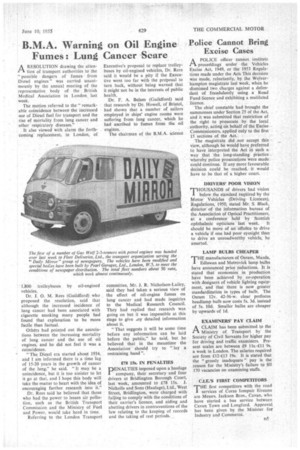B.M.A. Warning on Oil Engine Fumes : Lung Cancer Scare
Page 63

If you've noticed an error in this article please click here to report it so we can fix it.
A RESOLUTION drawing the atten
tion of transport authorities to the "possible dangers of fumes from Diesel engines" was carried unanimously by the annual meeting of the representative body of the British Medical Association in London last week.
The motion referred to the " remarkable coincidence betweerr the increased use of Diesel fuel for transport and the rise of mortality from lung cancer and other respiratory diseases."
It also viewed with alarm the forthcoming replacement, in London, of 1.800 trolleybuses by oil-engined vehicles.
Dr. 3. 0. M. Rees (Guildford) who proposed the resolution, said that although the increased incidence of lung cancer had been associated with cigarette smoking many people had found that explanation to be more facile than factual.
Others had pointed out the associations between the increasing mortality of lung cancer and the use of oil engines, and he did not feel it was a coincidence.
"The Diesel era started about 1934, and I am informed there is a time lag of 15-20 years in the growth of cancer of the lung," he said. "It may be a coincidence, but it is too sinister to let it go at that, and I hope this body will take the matter to heart with the idea of encouraging further research into it."
Dr. Rees said he believed that those who had the power to lessen air pollution, such as the British Transport Commission and the Ministry of Fuel and Power, would take heed in time.
Referring to the London Transport Executive's proposal to replace trolleybuses by oil-engined vehicles, Dr. Rees said it would be a pity if the Executive went too far with the proposal to turn back, without being warned that it might not be in the interests of public health.
Dr. F. A. Belam (Guildford) said that research by Dr. Howell, of Bristol, had shown that a number of sailors employed in ships' engine rooms were suffering from lung cancer, which he had ascribed to fumes from the oil engines.
The chairman of the B.M.A. science committee, Mr. J. R. Nicholson-Lailey, said they had taken a serious view of the effect of oil-engine fumes on lung cancer and had made inquiries to the Medical Research Council. They had replied that research was going on but it was impossible at this stage to give Any detailed information about it.
"That suggests it will be some time before any information can be laid before the public," he said, but he believed that in the meantime the Association should try to "lay a restraining hand ".
178 15s. IN PENALTIES
PENALTIES imposed upon a haulage company, their secretary and four drivers at Bridlington Borough Court, last week, amounted to £78 15s. J. Nicholls and Sons (Haulage), Ltd., West Street, Bridlington, were charged with faiIing to comply with the conditions of their carrier's licence, and aiding and abetting drivers in contraventions of the law relating to the keeping of records and the taking of rest periods.




























































































































































